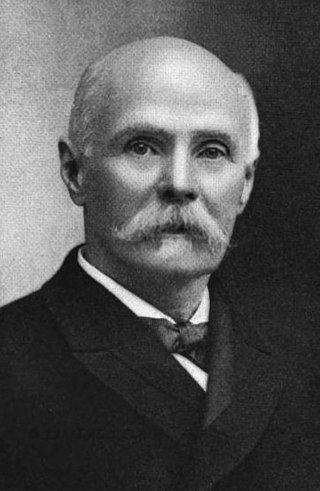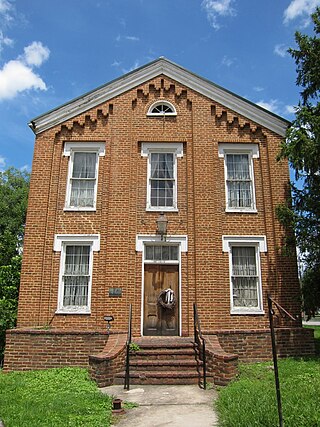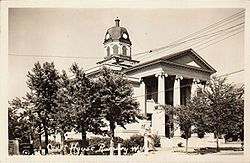
The Confederate Memorial at Indian Mound Cemetery in Romney, West Virginia, commemorates residents of Hampshire County who died during the American Civil War while fighting for the Confederate States of America. It was sponsored by the Confederate Memorial Association, which formally dedicated the monument on September 26, 1867. The town of Romney has claimed that this is the first memorial structure erected to memorialize the Confederate dead in the United States and that the town performed the nation's first public decoration of Confederate graves on June 1, 1866.

Capon Chapel, also historically known as Capon Baptist Chapel and Capon Chapel Church, is a mid-19th century United Methodist church located near to the town of Capon Bridge, West Virginia, in the United States. Capon Chapel is one of the oldest existing log churches in Hampshire County, along with Mount Bethel Church and Old Pine Church.

Robert White was an American military officer, lawyer, and politician in the U.S. state of West Virginia. White served as Attorney General of West Virginia (1877–1881) and served two terms in the West Virginia House of Delegates, representing Ohio County in 1885 and 1891.
William Armstrong was an American lawyer, civil servant, politician, and businessperson. He represented Hampshire County in the Virginia House of Delegates from 1818 to 1820, and Virginia's 16th congressional district in the United States House of Representatives from 1825 to 1833.
Francis White was a distinguished early American lawyer and politician in what was then the U.S. state of Virginia.

Literary Hall is a mid-19th-century brick library, building and museum located in Romney, a city in the U.S. state of West Virginia. It is located at the intersection of North High Street and West Main Street. Literary Hall was constructed between 1869 and 1870 by the Romney Literary Society.
Romney Academy was an institution for higher education in Romney, Virginia, United States. Romney Academy was first incorporated by the Virginia General Assembly on January 11, 1814, and was active until 1846 when it was reorganized as the Romney Classical Institute. In addition to the Romney Classical Institute, Romney Academy was also a forerunner institution to Potomac Seminary. Romney Academy was one of the earliest institutions for higher learning within the present boundaries of the state of West Virginia.

Alexander W. Monroe was a prominent American lawyer, politician, and military officer in the U.S. states of Virginia and West Virginia. Monroe served as a member of the Virginia House of Delegates and West Virginia House of Delegates representing Hampshire County. He was the Speaker of the West Virginia House of Delegates during the 1875–1877 legislative session. Monroe also represented Hampshire County in the West Virginia Constitutional Convention of 1872.

The Virginia Argus and Hampshire Advertiser, often referred to simply as the Virginia Argus, was a weekly newspaper published between July 1850 and August 1861 in Romney, Virginia. The paper's circulation of 800 copies was the second-highest in Hampshire County, after the South Branch Intelligencer's. The Virginia Argus ceased publication following its closure by the Union Army during the American Civil War, after which it was not revived.

Henry Bell Gilkeson was an American lawyer, politician, school administrator, and banker in West Virginia.
Robert White was an early American physician, military officer, pioneer, and planter in the Colony of Virginia.

John Baker White was a 19th-century American military officer, lawyer, court clerk, and civil servant in the U.S. state of Virginia.

Joshua Soule Zimmerman was an American lawyer, politician, and orchardist in the U.S. state of West Virginia. In the early years of the 20th century, Zimmerman served as the Prosecuting Attorney for Hampshire County and as a Democratic member of the West Virginia House of Delegates.

The Wirgman Building was an early 19th-century Federal-style commercial and residential building located on East Main Street in Romney, West Virginia. It was completed around 1825 to serve as the Romney branch office of the Bank of the Valley of Virginia, and served as a location for every subsequent bank established in Romney, including the Bank of Romney and the First National Bank of Romney. During the American Civil War, the building was used as a military prison. For a time, its second floor housed the offices and printing plant of the Hampshire Review newspaper, and by 1947 its ground floor housed office and mercantile space, and the second floor was divided into apartments.

Christian Streit White was an American military officer, lawyer, court clerk, pisciculturist, and politician in the U.S. states of Virginia and West Virginia.
Andrew Wodrow (1752–1814) was a prominent Scottish American merchant, militia officer, clerk of court, lawyer, and landowner in the colony of Virginia.
Romney Classical Institute was a 19th-century coeducational collegiate preparatory school in Romney, Virginia, United States, between 1846 and shortly after 1866. Romney had previously been served by Romney Academy, but by 1831 the school had outgrown its facilities. The Virginia General Assembly permitted the Romney Literary Society to raise funds for a new school through a lottery. On December 12, 1846, the assembly established the school and empowered the society with its operation.
Isaac Parsons was an American slave owner, politician, and militia officer in the U.S. state of Virginia. Parsons served as a member of the Virginia House of Delegates representing Hampshire County from 1789 until his death in 1796. Following an act of the Virginia General Assembly in 1789, Parsons was appointed to serve as a trustee for the town of Romney. In 1790, Parsons began serving as a justice for Hampshire County. He served as a captain in command of a company in the Virginia militia during the American Revolutionary War and continued to serve as a captain in the Hampshire County militia following the war. Parsons operated a public ferry across the South Branch Potomac River, and later died from drowning in the river in 1796. Parsons was the grandfather of Isaac Parsons (1814–1862), who also represented Hampshire County in the Virginia House of Delegates and served as an officer in the Confederate States Army.
Isaac Parsons was an American planter, politician, and military officer in the U.S. state of Virginia. Parsons served as a Justice of the Peace of Hampshire County's District 3 from 1852 to 1853. He later served as a member of the Virginia House of Delegates representing Hampshire County from 1854 until 1857. Parsons was the grandson of Virginia House Delegate Isaac Parsons (1752–1796), the great-grandson of Colonial Virginia military officer William Foreman, and the grandfather of First Lady of West Virginia, Edna Brady Cornwell (1868–1958).

The Romney Literary Society existed from January 30, 1819, to February 15, 1886, in Romney, West Virginia. Established as the Polemic Society of Romney, it became the first organization of its kind in the present-day state of West Virginia, and one of the first in the United States. The society was founded by nine prominent men of Romney with the objectives of advancing literature and science, purchasing and maintaining a library, and improving educational opportunities.





















